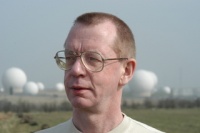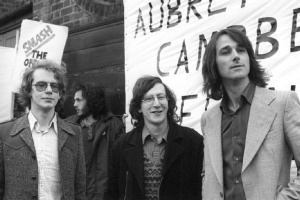Difference between revisions of "Duncan Campbell"
(Better sections) |
(The ABC Secrecy Trial – 40 Years On) |
||
| Line 33: | Line 33: | ||
In 1977-78, Duncan Campbell was prosecuted under the [[Official Secrets Act 1911|Official Secrets Act]] in the [[ABC Trial]] and made the series ''[[Secret Society]]'' for the [[BBC]] in 1987. Before the programme ran, however, the BBC became nervous about the nature of its content and approached the [[Margaret Thatcher|Thatcher]] government for advice. Their reaction was to raid the BBC’s Scottish headquarters and then Campbell’s home. [[Special Branch]] seized the film in what became known as the [https://en.wikipedia.org/wiki/Zircon_affair Zircon affair.]<ref>''[http://www.duncancampbell.org/content/biography#panorama "Duncan Campbell biography"]''</ref> | In 1977-78, Duncan Campbell was prosecuted under the [[Official Secrets Act 1911|Official Secrets Act]] in the [[ABC Trial]] and made the series ''[[Secret Society]]'' for the [[BBC]] in 1987. Before the programme ran, however, the BBC became nervous about the nature of its content and approached the [[Margaret Thatcher|Thatcher]] government for advice. Their reaction was to raid the BBC’s Scottish headquarters and then Campbell’s home. [[Special Branch]] seized the film in what became known as the [https://en.wikipedia.org/wiki/Zircon_affair Zircon affair.]<ref>''[http://www.duncancampbell.org/content/biography#panorama "Duncan Campbell biography"]''</ref> | ||
| − | |||
| − | |||
| − | |||
===GCHQ=== | ===GCHQ=== | ||
| Line 45: | Line 42: | ||
In [[Official Secrets Act 1989|1989]], Section 2 was amended to make it an offence to divulge information only in relation to six specific categories. | In [[Official Secrets Act 1989|1989]], Section 2 was amended to make it an offence to divulge information only in relation to six specific categories. | ||
| + | |||
| + | ===Echelon=== | ||
| + | In 1988, Duncan Campbell revealed the existence of the [[Echelon]] surveillance program.<ref>''[http://www.duncancampbell.org/ "Duncan Campbell, investigative journalist and forensic expert"]''</ref> | ||
===''New Statesman''=== | ===''New Statesman''=== | ||
| − | After the [[ABC Trial|trial]], Duncan Campbell joined the ''[[New Statesman]]'' magazine. During his 15 years, he investigated Britain’s secret phone-tapping centres, [[ | + | After the [[ABC Trial|trial]], Duncan Campbell joined the ''[[New Statesman]]'' magazine. During his 15 years, he investigated Britain’s secret phone-tapping centres, corruption in [[GCHQ]], secret war time plans to suspend civil liberties, and the top secret global surveillance programme, [[Echelon]]. Recently, he has produced reports based on the [[Edward Snowden|Snowden]] files for the ''Independent'', including how the British Embassy in Berlin was being used as a covert listening station. |
| − | == | + | ==More recently== |
In 2013, Campbell spoke at an event called [[Brighton CryptoFestival]] that aimed to raise awareness about government [[mass surveillance]] and the availability of countermeasures.<ref>''[https://www.cryptoparty.in/brighton_cryptofestival "Brighton CryptoFestival 2013"]''</ref> | In 2013, Campbell spoke at an event called [[Brighton CryptoFestival]] that aimed to raise awareness about government [[mass surveillance]] and the availability of countermeasures.<ref>''[https://www.cryptoparty.in/brighton_cryptofestival "Brighton CryptoFestival 2013"]''</ref> | ||
| + | |||
| + | In November 2017, marking the 40th anniversary of the arrests of the ABC three, [[John Ashley Berry|John Berry]] and Duncan Campbell took part in a panel discussion with [[Statewatch]] Director [[Tony Bunyan]] and [[Sarah Kavanagh]], NUJ Senior Campaigns and communications officer, looking at the events from those involved in 1977 and considering its legacy today. It was organised by Aubrey’s family as part of the [[Crispin Aubrey#Legacy Fund|Crispin Aubrey Legacy Fund]] set up to support aspiring journalists and in conjunction with the University of West of England’s Film and Journalism Department and Bristol Festival of Ideas.<ref>''[https://www.ideasfestival.co.uk/events/abc-secrecy-trial/ "The ABC Secrecy Trial – 40 Years On"]''</ref> | ||
{{SMWDocs}} | {{SMWDocs}} | ||
==References== | ==References== | ||
{{reflist}} | {{reflist}} | ||
Revision as of 20:53, 23 November 2017
(journalist, author) | |||||||||||||||||||||||
|---|---|---|---|---|---|---|---|---|---|---|---|---|---|---|---|---|---|---|---|---|---|---|---|
 At RAF Menwith Hill, eavesdropping base | |||||||||||||||||||||||
| Born | 1952 Glasgow, Scotland, United Kingdom | ||||||||||||||||||||||
| Nationality | British | ||||||||||||||||||||||
| Exposed | • ECHELON • GCHQ | ||||||||||||||||||||||
Celebrated investigative journalist.
| |||||||||||||||||||||||
Duncan Campbell is a British freelance investigative journalist, author and television producer, who revealed GCHQ and the ECHELON program in the course of his work.
Contents
Career
Since 1975 he has specialised in the subjects of intelligence and security services, defence, policing, civil liberties and, latterly, computer forensics. From 1978-91, he was a staff writer at the New Statesman and associate editor (Investigations) from 1988-91.
In 1977-78, Duncan Campbell was prosecuted under the Official Secrets Act in the ABC Trial and made the series Secret Society for the BBC in 1987. Before the programme ran, however, the BBC became nervous about the nature of its content and approached the Thatcher government for advice. Their reaction was to raid the BBC’s Scottish headquarters and then Campbell’s home. Special Branch seized the film in what became known as the Zircon affair.[1]
GCHQ
Duncan Campbell has exposed state snooping for nearly 40 years. In 1976, he revealed for the first time the existence of GCHQ (Government Communications Headquarters) in a piece for Time Out magazine called, "The Eavesdroppers". This led to his arrest in February 1977 with Crispin Aubrey and John Berry, and their being charged under Sections 1 and 2 of the Official Secrets Act 1911 (Berry was charged with "communicating classified information to unauthorised persons", and Campbell and Aubrey with "unauthorised receipt of classified information").[2]
ABC Trial
On 5 September 1978, the resulting ABC Trial opened at the Old Bailey in front of Mr Justice Willis but was stopped two weeks later after the jury foreman was exposed as a former SAS officer. Three weeks after the second trial opened in front of Mr Justice Mars-Jones on 3 October 1978, all Section 1 charges were dropped. On 17 November 1978, Crispin Aubrey, John Berry and Duncan Campbell were found guilty and received non-custodial sentences. The ABC Trial was described by defence witness Ewen Carmichael as "a farcical romp of political stupidity, as prosecution witnesses, testifying anonymously under letters of the alphabet – in particular witness B, Colonel Hugh Johnstone, head of Signals Intelligence – were identified to the public outside the courts, and later by NUJ members at their annual conference." To Crispin Aubrey, the prosecution's attempts at secrecy were "the security services trying to cloak their witnesses in anonymous letters and make the whole affair appear more sinister."
In 1989, Section 2 was amended to make it an offence to divulge information only in relation to six specific categories.
Echelon
In 1988, Duncan Campbell revealed the existence of the Echelon surveillance program.[3]
New Statesman
After the trial, Duncan Campbell joined the New Statesman magazine. During his 15 years, he investigated Britain’s secret phone-tapping centres, corruption in GCHQ, secret war time plans to suspend civil liberties, and the top secret global surveillance programme, Echelon. Recently, he has produced reports based on the Snowden files for the Independent, including how the British Embassy in Berlin was being used as a covert listening station.
More recently
In 2013, Campbell spoke at an event called Brighton CryptoFestival that aimed to raise awareness about government mass surveillance and the availability of countermeasures.[4]
In November 2017, marking the 40th anniversary of the arrests of the ABC three, John Berry and Duncan Campbell took part in a panel discussion with Statewatch Director Tony Bunyan and Sarah Kavanagh, NUJ Senior Campaigns and communications officer, looking at the events from those involved in 1977 and considering its legacy today. It was organised by Aubrey’s family as part of the Crispin Aubrey Legacy Fund set up to support aspiring journalists and in conjunction with the University of West of England’s Film and Journalism Department and Bristol Festival of Ideas.[5]
Documents by Duncan Campbell
| Title | Document type | Publication date | Subject(s) | Description |
|---|---|---|---|---|
| Document:GCHQ and Me: My Life Unmasking British Eavesdroppers | Article | 3 August 2015 | GCHQ UKUSA SIGINT Edward Snowden ECHELON Robert Hannigan ABC Trial Transparency International Menwith Hill Reiner Braun | No one at the May 2015 conference on intelligence, security and privacy argued against greater openness. Thanks to Edward Snowden and those who courageously came before, the need for public accountability and review has become unassailable. |
| Document:Memo To Prime Minister - Your Merchants of Death Are Cooking The Books | article | 17 October 1980 | Arms deal Margaret Thatcher Millbank Technical Services | |
| Document:Why the secret handshake between police and Freemasons should worry us | Article | 2 January 2018 | Metropolitan Police Freemasonry Brian Paddick | Successive Met Commissioners have tried to end the society’s influence. It is as clear as ever that membership of both bodies is incompatible with public service. |
